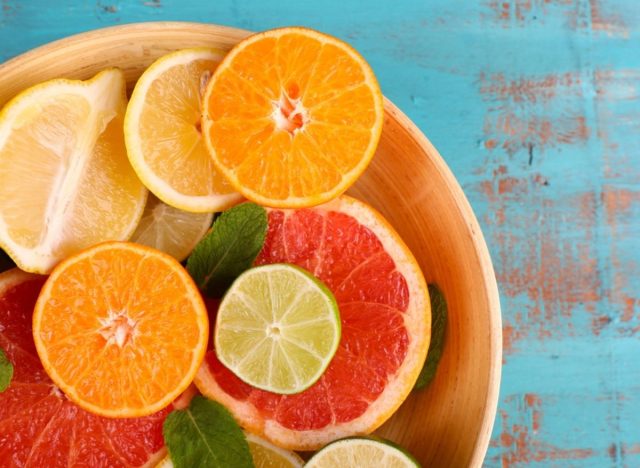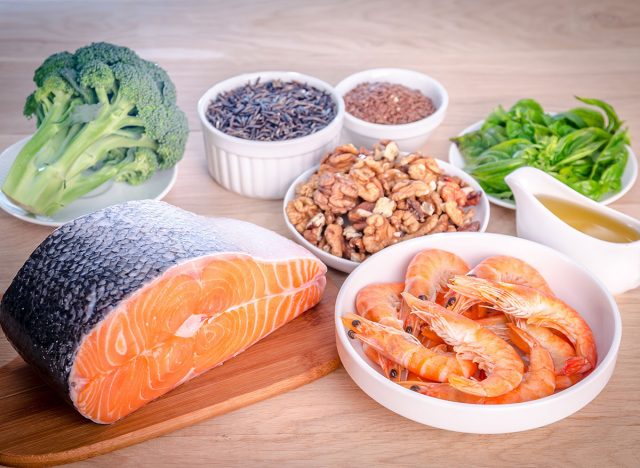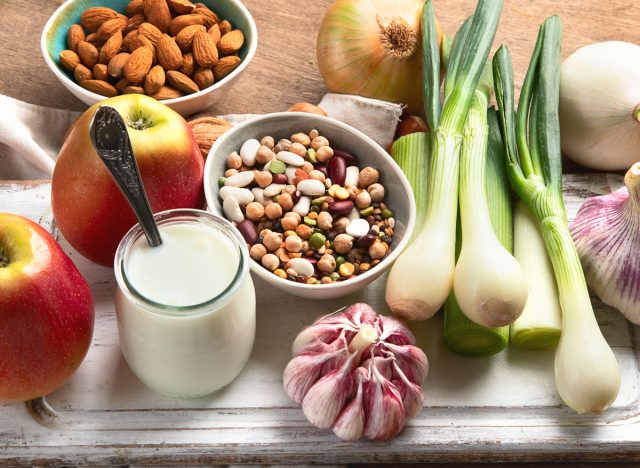Eating Foods High in These 5 Nutrients Can Boost Your Immune Health

Caring for your immune system is especially important in the winter, when cases of colds, flu, and COVID-19 tend to spike. However, your immunity deserves attention every day of the year if you want to stay as healthy as possible. To strengthen your immune system, the CDC recommends getting adequate sleep, avoiding excessive alcohol consumption, maintaining regular physical activity, and eating a healthy diet. And when it comes to the foods you eat, there are specific nutrients that can help promote immune health.
To learn more about these nutrients, we talked with Toby Amidor, MS, RD, CDN, FAND, award-winning nutrition expert and best-selling author of The Family Immunity Cookbook. “There is such a wide variety of nutrients that play a role in building a healthy immune system, which is why I recommend getting them through food rather than supplements if possible,” says Amidor. “Many of the phytonutrients and other components found naturally together in food help keep your immune system in tip-top shape, so a well-balanced diet that incorporates foods with these nutrients is really what you want.”
Below is a list of five helpful nutrients you can find in everyday foods that may help you keep your immune system strong, while also protecting your overall health. In some cases, you may not be able to get enough of these foods in your regular diet, so using supplements can help in these cases. Read on, then for more healthy eating tips, check out Secret Tricks for Eating Your Way to a Better Immune System.
Vitamin C

If you grew up being told to drink orange juice at the first sign of a cold then you already know that’s because vitamin C is one of the most powerful nutrients for your immunity.
“This antioxidant can increase the production of white blood cells, which help fight infection,” says Amidor. Interestingly enough, even though orange juice is the vitamin C-rich product you think of first, there are many other food sources that supply vitamin C. According to Harvard Health, the following foods pack a powerful punch of vitamin C:
- Bell peppers
- Citrus fruit
- Cruciferous vegetables like broccoli, cabbage, and cauliflower
- Strawberries
- White potatoes
Not surprisingly, fruits and vegetables are the best sources of this nutrient. However, Amidor points out that “According to the 2020-2025 Dietary Guidelines, about 90% of Americans don’t meet their daily veggie recommendations, and 85% don’t meet their daily fruit recommendations, which could mean they are also not getting all the recommended amount of daily vitamin C.”
Vitamin D
There isn’t much that vitamin D can’t do. From improving bone health, reducing cancer cell growth, lowering inflammation, and helping your body to absorb calcium, getting enough of this vitamin is crucial for your overall health. Along with these benefits, vitamin D may be able to help boost immunity, too. According to the CDC, vitamin D can help you fight off bacteria and viruses, and a review published in Nutrients says that this vitamin can help improve immunity by managing inflammatory responses.
If you’re looking for food or beverage sources that contain this helpful nutrient, Harvard Health recommends:
- Fish like tuna, salmon, sardines, or swordfish
- Fortified dairy products
- Fortified orange juice
- Egg yolks
- Beef liver
Omega-3 Fatty Acids

“EPA and DHA are two types of omega-3 fatty acids found naturally in marine sources, and the most common food source of both are fatty fish,” says Amidor. “Both EPA and DHA are found in all cells of the body and have also been shown to have anti-inflammatory functions, which could potentially increase the body’s ability to fight off illness.”
Another way that omega-3 fatty acids have been found to help your immunity is by offering certain protective effects against autoimmune disorders. An autoimmune disease, such as rheumatoid arthritis, lupus, or alopecia, can occur when your body’s immune system starts attacking healthy cells in your body, mistaking them for harmful ones. One study, published in the Journal of Clinical Investigation, revealed that long-term use of polyunsaturated fats (like omega-3s) can help protect against autoimmune disorders like type 1 diabetes.
According to the National Institutes of Health, some of the best sources of omega-3s include:
- Fish and seafood
- Plant oils like canola or soybean
- Nuts and seeds like flaxseed, walnuts, and chia seeds
- Foods that are fortified (including certain yogurt, eggs, juices, or milk)
Beta-Glucan
Fiber is an important nutrient for a healthy immune system, and according to the Harvard T.H. Chan School of Public Health, eating a high-fiber diet of mostly plants, with foods like fruit, vegetables, and whole grains, can help promote a healthy gut microbiome for stronger immunity. Amidor adds that one type of fiber in particular—beta-glucan—can help aid in immune health.
According to Amidor, “Beta-glucan is a type of fiber that helps boost white blood cells, which help fight infection. You can find beta-glucan in a variety of whole grains like barley, sorghum, rye, and wheat, and it’s a great reason why you should make half of your grains whole!” A report published in Frontiers in Immunology states that this fiber can help boost immunity by activating the immune cells in your body.
There are multiple grain sources of beta-glucan, according to Nutrition & Metabolism:
- Oats
- Barley
- Wheat
- Sorghum
Probiotics

Technically living organisms, probiotics are crucial for maintaining a healthy gut and strong immune system.
“Probiotics act as ‘good’ bacteria in your digestive system, which means they provide health benefits and help protect the digestive tract,” says Amidor. “Research has also shown that certain strains of probiotics can help boost your immune system and promote a healthy digestive system. Fermented food provides live, active cultures, many of which act as probiotics.” According to Amidor, some examples of probiotic foods include:
- Yogurt
- Kefir
- Sauerkraut
- Kimchi
- Source: https://www.cdc.gov/nccdphp/dnpao/features/enhance-immunity/index.html#:~:text=Our%20immune%20systems%20are%20complex,and%20avoiding%20excessive%20alcohol%20use.
- Source: https://pubmed.ncbi.nlm.nih.gov/29534432/
- Source: https://www.hsph.harvard.edu/nutritionsource/vitamin-c/
- Source: https://www.cdc.gov/nutrition/micronutrient-malnutrition/about-micronutrients/why-it-matters.html#:~:text=Vitamin%20D%20is%20essential%20for,fight%20off%20bacteria%20and%20viruses.
- Source: https://www.ncbi.nlm.nih.gov/pmc/articles/PMC3738984/
- Source: https://www.hsph.harvard.edu/nutritionsource/vitamin-d/
- Source: https://www.ncbi.nlm.nih.gov/pmc/articles/PMC6834330/
- Source: https://medlineplus.gov/autoimmunediseases.html
- Source: https://www.jci.org/articles/view/87388
- Source: https://ods.od.nih.gov/factsheets/Omega3FattyAcids-Consumer/
- Source: https://www.hsph.harvard.edu/nutritionsource/nutrition-and-immunity/
- Source: https://www.frontiersin.org/articles/10.3389/fimmu.2020.00658/full#:~:text=%CE%B2%2DGlucans%20initiate%20immune%20responses,receptors%2C%20and%20thus%20biological%20functions.
- Source: https://www.ncbi.nlm.nih.gov/pmc/articles/PMC3236515/









